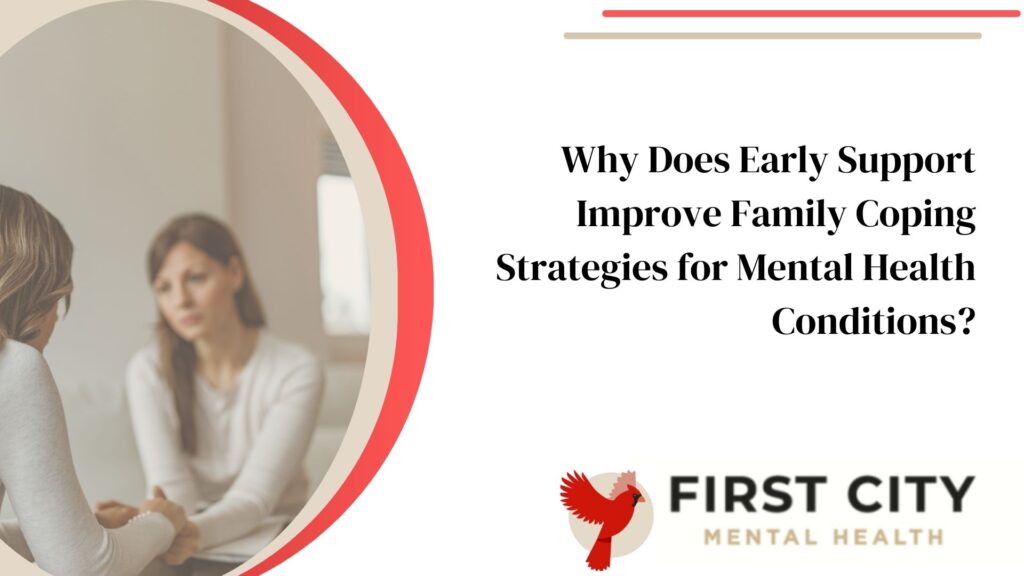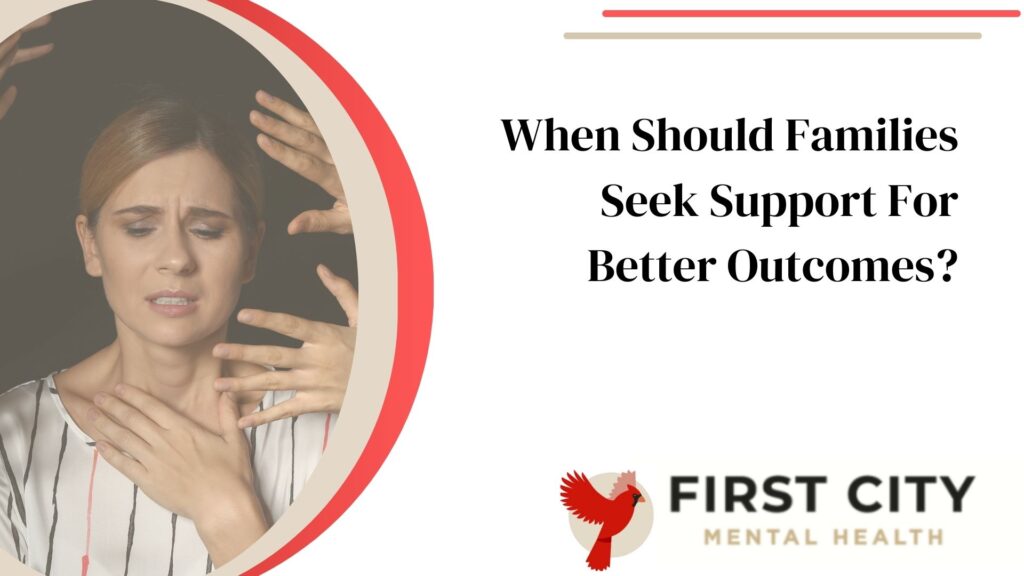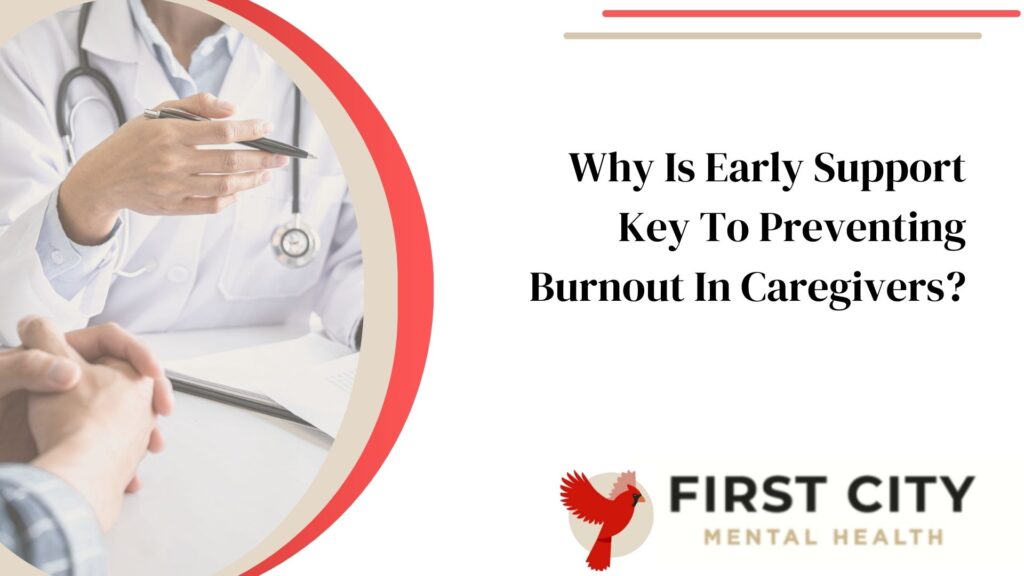
Where to Begin: First Steps in Co-Occurring Disorders Treatment
January 21, 2025
Why Are Relapses Common In Co-occurring Disorders Treatment?
January 21, 2025Does your family feel overwhelmed by dealing with mental health issues? You are not alone. Many families struggle to cope when a loved one has a condition like anxiety, depression, or co-occurring disorders.
It’s tough and can drain everyone emotionally.
Early support can make all the difference. For example, integration for co-occurring disorders treatment helps the individual and their family members. With early intervention, families learn coping strategies that lighten their emotional load by coordinating mental health services to address both psychiatric symptoms and substance-related issues simultaneously.
This article will show you why early support is essential for families facing these challenges. You’ll discover practical tips on seeking help and improving family bonds while preventing caregiver burnout.
Keep reading to find out more!
Key Takeaways
- Early support helps families manage stress better and understand mental health conditions more effectively.
- Timely intervention prevents issues from worsening, reduces risks like self-harm, and improves overall treatment success.
- Access to therapy, support groups, and alternative treatments such as yoga lowers stress levels for family members.
- Early help fosters stronger bonds within the family by encouraging open communication and breaking down stigma.
- Caregivers benefit from early support by reducing burnout risk and improving their ability to provide quality care.
Definition and Symptoms
Co-occurring disorders can encompass a wide range of combinations, such as a substance use disorder paired with a mental health condition like major depression. The symptoms of these disorders can interact and influence each other, complicating the course and prognosis of both conditions. For example, someone with a substance use disorder might experience physical symptoms like tolerance and withdrawal, behavioral symptoms such as neglecting responsibilities and engaging in illegal activities, and mental symptoms like anxiety and mood swings.
On the other hand, mental health disorders can manifest as mood disorders (e.g., depression, bipolar disorder), anxiety disorders (e.g., generalized anxiety, panic disorder), personality disorders (e.g., borderline personality disorder), and psychotic disorders (e.g., schizophrenia). Understanding these symptoms is the first step in seeking appropriate treatment.
Causes and Risk Factors
Researchers have proposed several theories to explain why substance use and mental health disorders often occur together. One theory suggests that substance use can trigger the onset of a mental health disorder. Another theory posits that individuals with a mental health disorder may turn to substances as a form of self-medication. Genetic and environmental factors also play significant roles in the development of dual diagnoses. For instance, trauma, stress, and other life experiences can contribute to the onset of both substance use and mental health disorders. Certain individuals may have a higher genetic predisposition to co-occurring disorders.
Environmental factors, such as exposure to stress or trauma, can further exacerbate these conditions. For example, conditions like bipolar disorder, schizophrenia, and antisocial personality disorder increase the risk of developing an alcohol use disorder. Similarly, substance use disorders are often linked to anxiety and depressive disorders. People with mental health disorders are more likely to develop a substance use disorder than those without such conditions.
What Are The Key Benefits Of Substance Use Disorder and Co-Occurring Disorders Treatment?
Co-occurring disorders treatment in Kokomo, Indiana addresses both mental health and substance use issues together. Dialectical behavior therapy is often used as part of these treatment approaches to improve coping skills and reduce maladaptive behaviors. This approach can improve the overall effectiveness of treatment for individuals with a mental disorder. A longer intervention period allows for comprehensive care of these complex conditions, preventing symptoms from getting worse over time.
Early diagnosis plays a crucial role in co-occurring disorders treatment programs. Timely support reduces serious risks like self-harm. Family involvement enhances outcomes too. Educating families about these disorders helps them provide better support at home, which aids recovery. Addressing both mental health and substance use issues together increases success, says Dr. Jane Smith, an expert in adult co-occurring disorders treatment.
Why Does Early Support Improve Family Coping Strategies for Mental Health Conditions?

Strong coping strategies build a solid foundation for families dealing with mental health issues. Early support taps into this by offering both emotional and practical help. The mental health services administration plays a crucial role in providing early support, ensuring families receive the necessary guidance and resources. Families find it easier to manage treatment steps when they get guidance early on.
This helps everyone understand the condition better and know how to handle symptoms as they appear. Support groups, therapy, and other resources provide a safe space for families. They offer advice based on real experiences.
Isolation often makes mental health struggles tougher on families. Early support breaks down these barriers by encouraging open communication and acceptance within the family unit.
It reduces stigma, allowing families to feel more united in their efforts. This sense of community improves outcomes and builds resilience among family members facing co occurring disorders treatment in Kokomo, Indiana or anywhere else.
How Does Early Intervention Reduce Stress For Family Members?
Early support equips families with the tools they need to manage mental health challenges. Access to counseling and support groups helps family members cope better. These resources provide a lifeline for those dealing with integrated treatment for co-occurring disorders Kokomo, Indiana.
Understanding emotional self-harm and grief through early intervention is crucial. Families gain knowledge that eases their anxiety. With treatment options, including alternative therapies like yoga and meditation, stress levels drop significantly, and addressing substance abuse alongside mental health issues is essential for promoting recovery and preventing relapse.
Early diagnosis allows for better symptom management, making life easier for everyone involved.
When Should Families Seek Support For Better Outcomes?

Improving treatment for co-occurring disorders outcomes for families dealing with mental health issues and mental illness can be challenging. Timely support can make a big difference.
- Diagnosis: Families should seek support when a member is diagnosed with a mental health disorder. This helps in understanding the condition and how to manage it.
- Crisis Situations: During crises, immediate intervention is crucial, especially if suicidal thoughts are present. Swift action can save lives.
- Periods of Grief and Loss: Seeking help during times of grief ensures emotional well-being for everyone involved. Mental health professionals can guide families through these tough periods. 4.
- Co-Occurring Disorders: Managing co-occurring disorders requires comprehensive care. Treatment for co-occurring disorders often involves different specialists, making early support essential.
- Symptom Identification: Families play a key role in spotting symptoms early on. Early identification leads to quicker access to treatment for conditions like schizophrenia or OCD. 6.
- Exploring Treatment Options: Understanding treatment options for disorders such as personality disorders can be overwhelming without guidance from professionals specializing in co-occurring disorders treatment centers.
- Understanding Diagnoses: Engaging early helps families understand mental health diagnoses deeply and address specific individual needs effectively.
Where Can Families Access Early Support Services?
Families can go to mental health care providers like psychiatrists and psychologists for early support services, especially when dealing with drug abuse and co-occurring disorders. They offer counseling, therapy, medication management, and support groups customized for conditions such as schizophrenia or Major Depressive Disorder.
Mental health support options also include immediate help for those with suicidal thoughts or self-harm tendencies.
Early intervention services give both emotional and practical advice. Families gain understanding of diagnoses and co-occurring disorders treatment centers options from these services. Seeking early support helps manage symptoms of PTSD and other disorders effectively.
Early help mitigates issues but also strengthens family bonds significantly.
How Does Early Support Strengthen Family Bonds?
Accessing early support services like adult co-occurring disorders treatment for mental disorders brings families closer. Emotional help and practical guidance during tough times enhance family ties. Facing mental health challenges together fosters understanding and empathy.
Early intervention reduces tension within the family unit, promoting resilience. These resources empower members to offer better support for those facing mental health struggles. Early support also breaks down stigma around these issues, encouraging open conversations at home.
What Emotional Benefits Do Families Gain From Early Support?
Early support helps families manage mental health conditions. This boosts emotional stability across the board. Families benefit from better understanding each other’s needs and feelings.
Improved attachment and mood make home life more harmonious.
Effective intervention addresses self-harm, grief, and other emotional struggles swiftly. Individualized treatment for co occurring disorders build resilience in family members. Emotional well-being becomes a shared goal in high-quality care settings, promoting overall happiness and connection among loved ones.
Why Is Early Support Key To Preventing Burnout In Caregivers?

Early support helps caregivers manage stress and challenges effectively, reducing the risk of burnout. Providing early support enables caregivers to maintain their physical and mental well-being.
Early support treatment of co-occurring disorders improves the quality of care for the person receiving assistance, preventing caregiver burnout. Caregivers with early support experience reduced stress and anxiety, leading to better health outcomes.
Establishing boundaries is easier for family members who receive early aid. Seeking help in coping becomes simpler too. This initial assistance fosters positive caregiving experiences, enhancing a caregiver’s sense of fulfillment and purpose.
Early intervention also aids in developing resilience to handle caregiving demands efficiently.
Final Thoughts
Early support for family members offers a wealth of benefits. It helps families cope better and reduces stress significantly. Stronger family bonds form, creating a supportive home environment.
Early intervention is key to preventing caregiver burnout. Accessing early support services co-occurring disorders treatment program can lead to improved outcomes. Don’t wait, seek help now for the well-being of your loved ones and yourself!
FAQs
What are the benefits of early support for family members dealing with co-occurring disorders?
Early support can help families understand co-occurring disorders treatment options and manage stress. It aids in identifying effective strategies to treat co occurring disorders.
How does early intervention impact the treatment for co-occurring disorders?
Early intervention improves outcomes by addressing issues before they escalate. This proactive approach makes the co-occurring disorders treatment more manageable.
Can early support make a difference in long-term recovery from co-occurring disorders?
Yes, it can! Early support lays a foundation for lasting recovery by providing tools and resources needed to cope with challenges related to co-occurring disorders treatment.
Why is it important to seek help early when dealing with co-occurring disorders treatment
within a family?
Seeking help early helps prevent further complications and promotes healthier relationships within the family unit while navigating through the complexities of treating these conditions.






